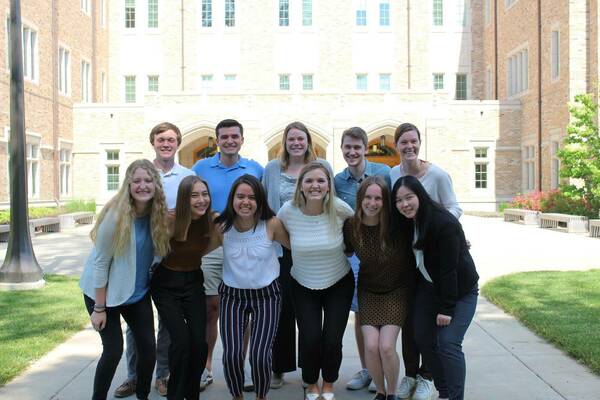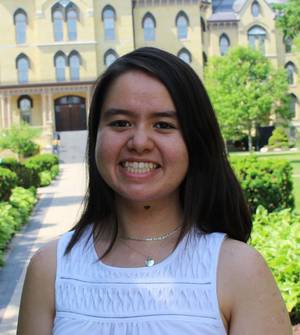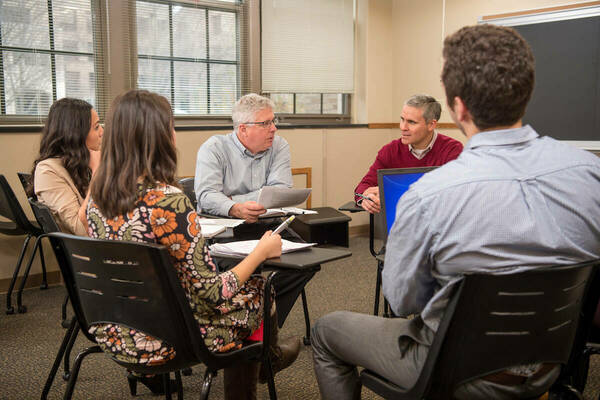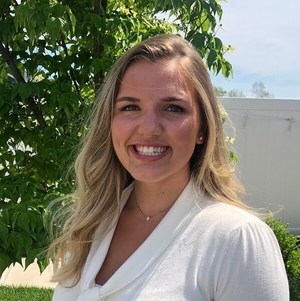Each person working at LEO is passionate in their own right, with big dreams and a fierce determination to fight poverty. However, the most powerful thing about LEO is that these individuals aren’t working alone. Instead, they’re connected to hundreds of like-minded people both at Notre Dame and in partner organizations across the country that they can find inspiration in, learn from, and grow with.
This special dynamic is especially apparent to the Notre Dame undergraduate students who work for LEO and find ourselves surrounded by great mentors to learn from. After spending two summers as an undergraduate Project Development Research Assistant with LEO, Brigid Meisenbacher (ND ‘22) says that “working at LEO, you have access to such a rich knowledge base that wouldn’t be as readily accessible otherwise. I’m really grateful for that.”

Housing both the economics department and the LEO offices, Notre Dame’s Jenkins-Nanovic Hall is packed with opportunities to meet people who are working on solving interesting and important problems. Whether attending “brown bag” faculty presentations hosted by the economics department, joining a lunchtime discussion of an aspect of LEO’s work, or just walking through the building for a meeting, LEO’s undergrad students are bound to run into someone with similar interests who cares deeply about the world around them. Many students say that starting an internship with LEO feels extra special because they’re joining a broader departmental community, one where economics educators and researchers are constantly collaborating to refine their work and support each other.
“The LEO network is so dense with very passionate people,” adds Brigid. “There’s a lot of people who care and because there’s a lot of people who care there’s always something to learn.”
Being connected to great mentors is particularly important for undergraduates as we try to figure out where we want the next few years of our lives to take us. Having exposure to professors and researchers completing meaningful work can help us visualize future careers we may have never considered otherwise.
During her first summer as a research assistant, Brigid realized how important the issues LEO tackled were to her. The environment she found at LEO was unique and it affirmed her vision of a future career in research: “I knew I would find fulfillment in LEO’s type of work.”
More immediately, working for LEO also influenced which classes she wanted to take. “Class-work wise, once you become aware of these issues and how dynamic these issues are,” Brigid says, “it’s just kind of natural that you would want to learn more about them. So that’s shaped my coursework.” LEO even helped her discern the subject matter for her senior thesis and find her thesis advisor, a LEO faculty affiliate whom Brigid got to know through weekly calls for a project they shared. Her time spent at LEO has allowed her to complete meaningful work now, as well as nurture important relationships for the

future.
Tess Monahan (ND ‘22), an undergraduate Project Development Research Assistant like Brigid, also found that LEO could connect her to ideas and professors in her field of interest. During her first summer at LEO, Tess worked on a few education-related projects and really enjoyed them. They inspired her to take an education policy class and later frame her senior thesis around economics and education. Tess had also always wanted to take Notre Dame’s Economics of Education course taught by Professor Chloe Gibbs, but couldn’t make it mesh with her schedule. However, working with LEO this past summer gave her something even better: Tess got to work directly with Professor Gibbs, another LEO faculty affiliate, to research an early childhood education program.
Many of the regular interactions that undergraduate interns have with LEO faculty and staff have developed into mentorships. Aside from the faculty whom Brigid and Tess have gotten to work alongside, they both credit their supervisor, Project Design Manager Brendan Perry, as someone who has been instrumental in guiding their learning and growth. Being part of LEO means undergrad students like Brigid and Tess have constant access to a vast knowledge base. They are able to meet people who are passionate about similar things, work closely with professors who are top experts in the field of economics, and gain clearer insight into the daily life of an economist.
Brigid describes the results of these relationships this way: “Mentorship at LEO is very accessible. The involvement of LEO interns in the work makes you feel that you are being mentored in a way that fosters your own value. They are mentoring you to start having your own impact. You’re definitely being given the opportunity to work in a way that matters.”
Matt Brown (ND ‘19), a former LEO undergraduate intern currently pursuing a PhD in Economics at Stanford, certainly found that to be the case. “LEO definitely convinced me that econ research would be an awesome place for me,” Matt recalled. “There's no way I'd be at grad school right now without [LEO co-founders] Jim and Bill. They convinced me it was a good option, and they were right.”
Once Matt decided to pursue his PhD, Jim and Bill helped him along the way with advice for classes, application process guidance, and even letters of recommendation. The community that LEO has built is a supportive environment that helps undergraduates not only visualize their life goals, but also come to realize them.
Beyond the relationships built at LEO’s physical offices on the Notre Dame campus, LEO’s research connects undergrads with a broad network of social service providers across the country. Tess Monahan works closely with LEO’s newest provider partners as they design their research studies. “What I really like about my position,” she says, “is not only do I get to work with Brendan, who is awesome and has definitely been a good mentor for me, but I also get to work with all of the different people at the partner organizations. It’s really nice to see what they do and get a deeper understanding of the service provider side and see them lead their programs.”
At many institutions, a rigorous economic research assistant opportunity like LEO’s would only be open to graduate students. But at Notre Dame, students have access to these incredible research opportunities at an early stage. Getting involved with research early on is important for building knowledge and identifying life passions. Brigid explains, “One of the challenging things about college is that there’s almost too many things to care about, which is great because it’s a time for exploration. But LEO has been useful for me in defining what exactly it is that I really do care about.” Increasing our exposure to careers at LEO during these vital, formative years broadens our view of what’s possible and inspires many students to pursue further study of economics and anti-poverty work. Our time spent learning at LEO now is so that we can better contribute to this type of work in the future.
Matt Brown agrees with the formative role LEO plays in students’ futures. “Talking to Jim about what grad school life was like and how the process works really helped me become sure of my

decision,” he says. “The way he interacted with me and the other people at LEO—it inspires me. If I do ever end up in academia—which I think is my dream—I would want to be that way too. He’s a good model for anyone who's ever going to have students about how you should treat them.”
The gratitude Matt feels for his own undergrad experience is one of the reasons he continues to be involved in LEO’s mission. Today, Matt is part of a LEO working group that is designing an expanded undergraduate and post-graduate program. “LEO gave me great exposure to econ research in a setting where everyone was trying to learn things about the world so that we can improve people’s lives,” he says. “I want more students to have that type of experience.”
Many undergraduate interns are still deciding what they want to do after LEO

and their time at Notre Dame. Even for those who choose not to pursue a graduate degree in economics, time spent at LEO is a valuable way to discern which part of the poverty-fighting process they want to get involved in. For Tess, that discernment came from being able to work so closely with service providers. She explains, “I’m interested in evidence-based policy making, which is obviously also important to LEO. I’m getting a really good taste of the beginning of that process, making the evidence, and learning with the partners who are actually in the field and are the ones really driving the process.”
A reason why many students choose Notre Dame is the desire to be a force for good in the world. When you encounter LEO, where so many people are acting on that goal with a clearly tangible impact, it’s impossible to ignore this life call. Brigid explains why she chose to work at LEO this way: “Genuinely everyone at LEO is so eager to do this work. It’s so palpable at LEO, in whatever stage of the work you’re in, that they are dedicated to producing these answers for themselves, for academia, for the providers, just for a bigger good.”
With a mission as compelling as LEO’s, it’s easy to be passionate about our work. That mission attracts an incredibly rich community full of supportive mentors and valuable experience that we, as interns, are incredibly thankful to be a part of.